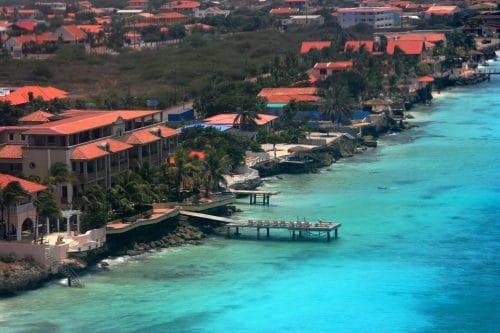Bonaire
Bonaire is an island of the Netherlands Antilles located in the Caribbean, with Aruba and Curaçao known as the ABC islands.
Especially known for being a stopover for cruise ships in the Caribbean.
Located just a hundred miles from the northern coast of South America, near the western part of Venezuela.
Unlike the other islands of the Caribbean, Bonaire is located outside the “Hurricane Belt”, and its climate is rather dry and even arid, which is very favorable to tourism. You can certainly expect a warm temperature and a lot of sunshine. The average temperature is 27.5 degrees celsius with +/- 1.4 degree of variation in season.
To see in Bonaire, diving and snorkeling sites in reefs preserved and easily accessible from the coast of the most famous in the world, Lake Bay attracts the windsurfer of the whole world but it is also one of the mangroves Caribbean best preserved very popular for a kayak trip.
The tourist infrastructure in Bonaire is contemporary and offers a variety of types of accommodation including hotels, full resorts, a few small bed & breakfast, and independent vacation rentals of all kinds. Other tourist activities include kite-boarding, mountain biking, hiking, sailing, boating and bird watching.
WHAT VACCINES DO I NEED FOR BONAIRE In 2026
The Government of Canada and the CDC recommend the following vaccines for travelling to Bonaire In 2026: Traveler’s Diarrhea, Hepatitis A, Hepatitis B, Rabies, Flu, COVID-19, Typhoid fever, Yellow Fever, Cholera
HEALTH INFORMATION
Risk of Zika in this Country. Learn More >>
We make every effort to ensure that the information posted on our website is up to date and accurate according to the latest public health recommendations; however, it is impossible for us to make changes on a daily basis.
For the most current travel health recommendations, please call our clinic as make an appointment with one of our travel health professionals.
BONAIRE – RECOMMENDED VACCINES
| The Yellow Fever Vaccine | A proof of vaccination against yellow fever may be required upon entry in to this country. Some travellers may not be eligible to receive this vaccine. Please enquire with your health care professional regarding your specific details. It is important to note that the vaccine should be administered at least 10 days prior to your departure. For further information, please consult with the World Health Organization (WHO) website: https://www.who.int/ith/ith- |
| Hepatitis A | Recommended for all travelers. |
| Transmission, Symptoms and Prevention – Rabies | For travelers at high risk of animal bites or being involved in activities with bats. Clients who plan to visit remote areas may consider receiving this vaccine. Important to note the pre-exposure rabies vaccine is administered in 2 doses with one week interval between doses. Post-exposure vaccination is always recommended, even for those previously vaccinated. |
| Flu – Influenza | Seasonal influenza occurs worldwide. The flu season usually runs from November to April in the northern hemisphere, between April and October in the southern hemisphere and year round in the tropics. Influenza (flu) is caused by a virus spread from person to person through coughing and sneezing or by touching infected surfaces. Everyone 6 months and older should get a flu vaccine yearly. Vaccine is recommended 14 days prior to departure. |
| Routine vaccines (dCaT, Polio, Meningococcal, Shingles, Pneumococcal, Hepatitis B, HPV, MMR & Varicella) | Recommended for all travelers |
| Causes, Symptoms & Treatment – Typhoid fever | Recommended for most travelers, especially those who are staying with friends or relatives; visiting smaller cities, villages, or rural areas where exposure might occur through food or water; or prone to “adventurous eating” |
| Hepatitis B | Consider for most travelers; recommended for those who might be exposed to blood or other body fluids, have sexual contact with the local population, or be exposed through medical treatment (e.g., for an accident). |
| Turista – Traveler’s Diarrhea (ETEC) | Talk to your health care professional about the risks and precautionary measures to take, as well as the Dukoral® vaccine. Important to note that the Dukoral vaccine is an oral vaccine given in 2 doses, recommended at least 2 weeks prior to departure. |
| Dengue Fever, Chikungunya and/or Zika | There are many illnesses that are transmitted via mosquito bites and unfortunately we do not have vaccines to protect us against most of them. It is important to inquire with your healthcare professional regarding the specific risks and the different illnesses presently in circulation. |
RECOMMENDED MEDICATIONS
| Antibiotics Traveler’s Diarrhea | Ciprofloxacin, Azithromycin or Suprax. |
SECURITY ABROAD
Petty crime occurs in Bonaire.
CANADIAN EMBASSY
Emergency services
Dial 911 for emergency assistance.
